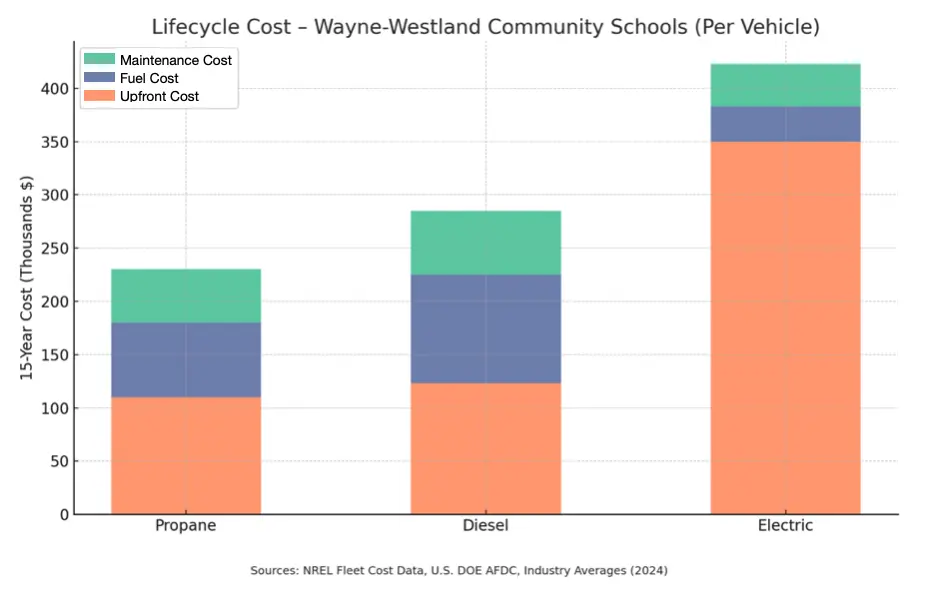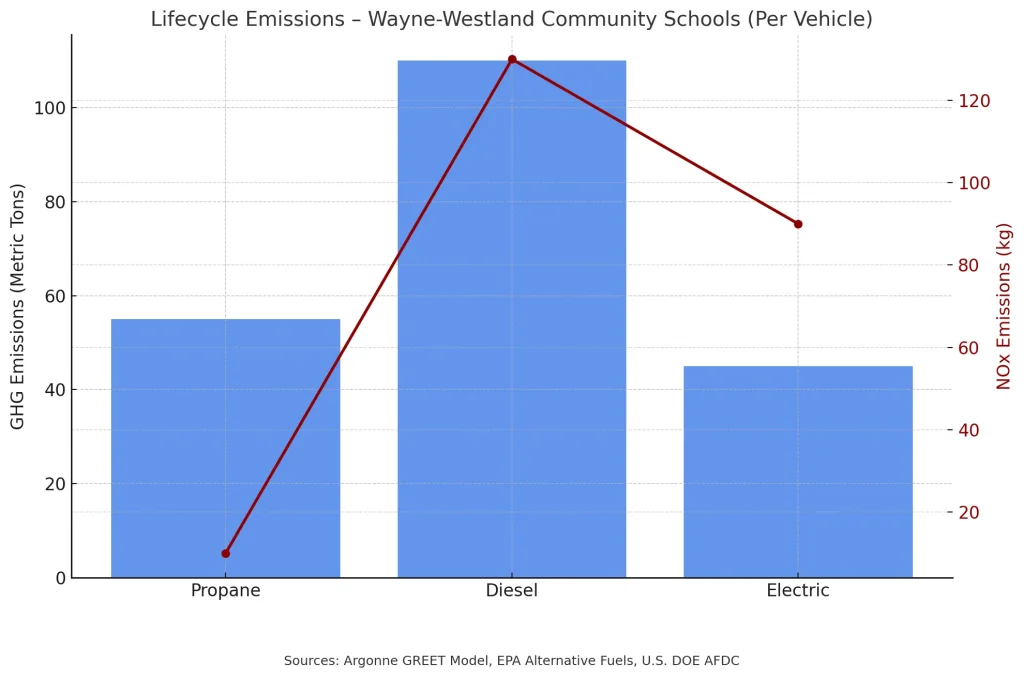Wayne-Westland Community Schools Cuts Costs and Emissions with Propane-Powered Buses

Wayne-Westland Runs on Propane
- Propane School Bus Fleet – 23
- Savings: Fuel Cost and Maintenance
- Students Transported Daily: 3,000
In the 2019-2020 school year, Wayne-Westland Community Schools began transitioning to propane-powered school buses, serving more than 3,000 students daily across the district. These buses transport students for pickups and drop-offs at school, field trips, and sports team activities, covering an average of 8,000 miles annually per bus.
Chad Kundrick, Director of Transportation at Wayne-Westland Community Schools, stated, “ We switched due to cost savings, tax benefits we could get, and the lower maintenance.”
Propane–Reliable Fuel. Real Savings.
Propane offers a cost-effective solution for school transportation. Compared to diesel and electric buses, propane models are less expensive to fuel and maintain, allowing Wayne-Westland to direct more of its budget toward school budget line items.
Kundrick reported that their biggest savings from switching to propane happened right off the bat: the cost of the buses, the fuel, and the maintenance costs.
“The cost of savings and maintenance comes from not having to use a DEF diesel exhaust fluid as well as not having to use any of the components of the entire system that tend to fail and go bad after so many miles on a diesel bus.”
He mentioned three big differences between propane and diesel buses in a recent interview with the Michigan Propane Gas Association.
“The three biggest differences between propane and diesel buses is: one, they’re quieter to run, and they’re more enjoyable for the driver so you can focus on your kids as well as what’s going on around you. Two, they warm up a lot faster in the winter. I don’t know about other people, other bus drivers, but I like a warm bus and these buses warm up quick, which is always nice. And three, they have cleaner emissions. You don’t have to worry about that when you’re driving around. I mean, you know you’re doing something good for the environment.”
Wayne-Westland has even taken a propane bus to Grand Rapids last summer. They did have to find a fueling station to top off the bus along the way, but only a small amount of propane needed to be refueled for that trip. Kundrick mentioned that it wasn’t difficult to find a fueling station. He used AFDC’s propane fueling station map of Michigan to locate a location. The Michigan Propane Gas Association also has a complete map of fueling stations and works with AFDC to ensure both map information aligns as new propane fueling stations in Michigan come online.
Cleaner, Lower-Emission Transportation
Propane is a nontoxic, low-emission fuel that won’t contaminate air, soil, or groundwater. It’s the third most widely used transportation fuel in the world—right behind gasoline and diesel—and is officially recognized as an alternative fuel under the Energy Policy Act of 1992.
According to the U.S. Department of Energy Alternative Fuels Data Center (AFDC), propane buses emit up to 96% less nitrogen oxides than diesel buses. These harmful pollutants are associated with respiratory issues, particularly in children. By switching to propane, Wayne-Westland helps protect student health while reducing its carbon footprint.
“Being a clean fuel, it makes it a lot easier for us. Especially the kids, they are not inhaling all that smoke and exhaust from the diesel buses. By switching to propane school buses, we’ve been able to reduce our emissions by over 122,000 lbs of CO2 per school year just by switching from propane buses to diesel buses.”
“The main reasons why I like Propane School Bus is that: 1. They save the district money and fuel costs. 2. They're extremely easy to use as well as fill up. And 3. They just perform better in the winter, in my opinion.”
Chad Kundrick, Director of Transportation
Trusted by Schools. Proven on the Road
Propane-powered vehicles are a proven safe choice for both drivers and passengers. In Michigan, more than 700 propane school buses are already in operation across over 40 school districts—delivering a fuel option that’s both reliable and budget-friendly.
Propane fuel tanks are engineered for safety. Constructed from carbon steel, they’re 20 times more puncture-resistant than gasoline or diesel tanks. Each tank is built to meet rigorous standards set by the American Society of Mechanical Engineers, ensuring long-lasting durability for student transportation.
Propane also offers added safety at the pump. With a narrower flammability range than gasoline or diesel, the risk of accidental ignition is lower. On top of that, every propane fueling station features a built-in lock-off valve that automatically stops fuel flow if a pressure drop is detected—providing an extra layer of protection for school fleets.
“Overall, propane school buses are very safe and reliable.”
Switching from Diesel to Propane Is Easier Than You Think
Transitioning your fleet to propane is a straightforward move, especially when you factor in its performance, cost savings, and reliability.
Most schools contact their local propane company to procure a propane contract and have a propane storage tank installed on-site, as seen at Wayne-Westland Schools. However, there are other fueling options available to schools, such as public fueling stations and mobile fueling services. There are several options to choose from, learn more at: MiAutogas.com
Kundrick reported that the propane tank infrastructure was already installed on site when he started as Transportation Director, but did speak to the ease of fueling a propane bus.
“The ease to fill a propane bus with these new nozzles is extremely easy. It basically locks on to the bus and the nozzle and it prevents any spillage whatsoever. It will shut off automatically.” He also mentioned that training to fill a bus is equally easy, “Training to fuel a propane bus is super easy. [Training] usually takes about 20 to 30 minutes when all said and done.”
Winter-Ready School Buses, Powered by Propane
Wayne-Westland’s propane buses start reliably in Michigan’s freezing winter mornings—without the need for costly engine block heaters, fuel additives, or backup generators that diesel and electric buses often depend on. This simplicity leads to less downtime and safer, more consistent transportation for students.
Kundrick confirmed, “With propane buses, you know, they don’t require the block heater or anything to get started in the winter. Every time I’ve gone out to start a propane bus, when it’s zero degrees outside, it starts right up because the propane likes the cold.”
Propane school buses handle Michigan’s wintry, icy roads the same as any bus, but with one big difference: they heat up a lot quicker. “From my experience driving these propane buses, they perform admirably in the wintertime. In fact, I would probably drive one of these over a diesel bus in the winter if I had my preference. The reason you want to take a propane bus over a diesel bus in the winter is that they warm up a lot quicker. Your heaters will be pumping out heat really quickly. That is the benefit.”
$6,000 Available from the Michigan Propane Gas Association
With budget constraints and a big push to transition Michigan’s fleets to cleaner fuels, the Michigan Propane Gas Association is here to help. The MPGA is offering fleets up to $6,000 to help them immediately reduce transportation operation costs and reach carbon footprint goals. The MPGA propane fleet experts are available to help with a smooth transition to propane with fleet directors/managers, treasurers, and superintendents.
Learn more at: MiAutogas.com/#funding


